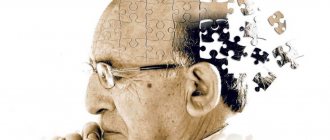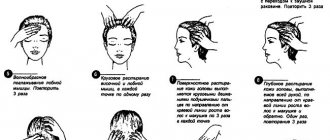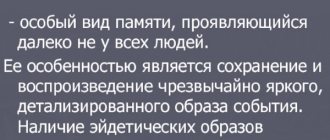Some diseases of the nervous system are accompanied by partial or complete loss of memory - amnesia. In this condition, a person loses the ability to reproduce information about himself and the events of his life.
Signs of amnesia manifest themselves in different ways and at any age, so it is advisable to have an idea of what types of amnesia exist, what are the reasons for the development of this condition, and also which specialists treat this ailment.
Kinds
Experts distinguish the following types of amnesia:
- Childhood - characterized by a person’s lack of memories of infancy. This condition is typical for almost every person.
- Anterograde - a person is unable to remember new events that have happened in his life.
- Retrograde - memories that occurred before its loss disappear from memory.
- Dissociative fugue - a temporary loss of identity occurs when a person mistakes himself for another, and then there is a sharp return of memory.
- Dissociative - specific facts or events from life are forgotten, but the person continues to retain universal knowledge.
- Transient epileptic – temporary memory lapses when the patient continues to behave adequately.
- Cryptomnesia – the source of the information received is forgotten, and the person passes it off as his own.
Myths about memory
Professor Kekelidze refutes the most common misconceptions. Is it possible, by influencing memory (taking it away and then selectively restoring it), to turn a person into a zombie, a biorobot? This is not about memory. Is it possible to make a person disabled by cutting off his hand? In the same way, you can influence the brain in various ways - hit it on the head, stop the supply of oxygen for a while, so that it does not die, but its intelligence decreases, and it becomes pliable and obedient. But it is impossible to selectively influence - that is, program to perform only certain actions.
— Is it true that after memory loss and its restoration, a person can suddenly speak foreign languages?
— This myth spread after the erroneous conclusions of German experts. Once upon a time in one of the southern cities of our country such a story happened. The man on the train was stopped by inspectors and asked to show his ticket. But the stowaway passenger could not understand what they wanted from him and why he needed a ticket. The controllers felt that something was wrong with him - the man did not look like an ordinary “hare”. Then they realized that the person had impaired memory. It was shown on TV. It was discovered that he was a former Soviet German living in Germany, where he disappeared. And after a while the man suddenly spoke in German. Everyone decided that after losing and regaining his memory, he acquired an extraordinary ability for foreign languages. After all, the victim was sure that he only knew Russian. In fact, knowledge of the language was just a memory. We conducted experiments that proved: there can be no improvement in memory from unknown substances that can “turn it off” and return it. When, after a disorder of consciousness, a person’s memory returns, he remembers only what he really knew.
— Does it happen that a person is hit on the head, and then he wakes up and discovers that he has psychic abilities?
This is a very popular stereotype. But I must disappoint: if, say, a person under the influence of severe stress suddenly lost consciousness, fell and hit his head, unfortunately, no extraordinary abilities will appear in him after that.
Causes
Experts say one of the reasons for the occurrence of amnesia is the presence of mental and neurological diseases. It is these patients who often have memory problems. Pathologies that can trigger amnesia include epilepsy, dissociative disorder or multiple personality disorder, hysteria, schizophrenia and Alzheimer's disease.
Other provoking factors may be blunt or penetrating head injuries, infectious lesions of the brain or nervous system, including AIDS, hepatitis, and poisoning with toxic substances. In addition, it can be caused by: vitamin B1 deficiency in the body, hypoxia, impaired blood circulation in the brain tissue, the appearance of tumors, as well as surgical interventions.
Description of amnesia
The disease is translated from Latin as “unconsciousness.”
The absence of memories is not always associated with certain disorders in the body. Absolutely everyone has “childhood amnesia.” It is impossible to find a person who would remember the first months of his life. A condition in which the patient loses memories that were previously present is considered pathological. How do you get amnesia? Most often, unpleasant symptoms develop as a result of severe emotional shock or traumatic brain injury. An interesting fact is that up to 25% of the entire adult population of the planet suffers from memory impairment. However, the symptoms are so insignificant that it is not possible to diagnose the disease at an early stage. Along with amnesia, the patient may experience a weakening of the ability to remember and navigate in time and space.
Which doctor treats
In case of sudden memory loss, confusion, disorientation, head injury and other similar symptoms, you should consult a neurologist. Most often, this specialist treats amnesia.
In addition to a neurologist, you may need the help of specialists such as a narcologist, a traumatologist, an infectious disease specialist and a neurosurgeon.
This clinic employs experienced neurologists and a powerful diagnostic base (MRI, ultrasound, Electroneuromyography, etc.). After treatment, high-quality rehabilitation measures are provided. In other words, the patient, while in the clinic, can undergo diagnostics, receive consultation from doctors and begin to recover.
Amnesia is a symptom, in the event of which a person’s relatives or a person, if possible, need to make an appointment with a neurologist. Depending on the type of amnesia, our specialist will determine the causes of its occurrence, as well as treatment tactics and rehabilitation measures.
IMPORTANT! A consultation with a neurologist will help determine further actions to restore the patient’s memory. In addition, the neurologist, if necessary, will refer the person to a narcologist, traumatologist, infectious disease specialist and neurosurgeon.
Make an appointment with a neurologist at our Kuntsevo treatment and rehabilitation center - and help yourself or a loved one get rid of amnesia!
Sign up
Special exercises
"Rite"
The essence of the exercise is to get rid of bad memories in the form of a ritual. A person responds well to various psychological anchors created by psychotechnics.
- Option 1.
Wash away memories by pouring water on yourself. It is necessary to imagine a negative experience in the form of dirt or dust adhering to the body. In the process, the water washes away all this dirt, freeing the consciousness. If fantasy is developed well enough, the technique will help you completely get rid of worries about negative experiences. - Option 2. Burn your memories by first writing them down on a piece of paper. It is better to describe the event or situation in as much detail as possible in order to draw the emotions out. Then it will be easier to remove them thanks to the visual sequence of human actions.
- Option 3. You can bury memories if there is something associated with a negative event. In this case, you can arrange an impromptu funeral for this thing, mentally connecting and burying all negative emotions with it.
"Perception"
You need to remember the events as a fragment from a film, i.e. watching him from the side.
Now you can start:
- scroll through the situation in your head, trying on the role of each participant in the event;
- scroll through the situation in your head as if you were looking at what is happening through a TV screen, changing the playback speed from minimum to maximum;
- “color” the picture, observing it in green, red, blue;
- Zoom in and out of people participating in dialogues.
All this will help reduce the significance of the event and the individual people involved in the situation.
Treatment methods
To combat amnesia, doctors use an integrated approach, which involves both psychotherapeutic influence and drug therapy.
Treatment of amnesia is carried out under the strict supervision of a doctor, taking into account the reasons that provoked the onset of the disease. Today, a lot of methods and techniques have been developed, and many medications are produced to help solve this problem. At the same time, special exercises are used to train memory.
Homeopathy
Homeopathy can also be beneficial in treating memory loss. There are a number of homeopathic medicines that are most effective:
- Golden iodine. Helps in improving cerebral circulation.
- Memory. Controls oxygen saturation, leads to immediate memory improvement.
- Huato. Has a nootropic effect. Improves the activity of the cerebral cortex and nervous system.
- Edas-138 Arnaur. Helps improve brain activity. The drug is prescribed for deterioration of thought processes during brain aging.
- Afosar-Edas. Helps in increasing resistance to stress, improves blood circulation in the brain, and the working processes of the cardiovascular system.
- Polymnesin. Improves the thought process, helps in the treatment of memory disorders.
- Cerebrum compositum. A complex of vitamins and minerals to improve brain activity.
Rehabilitation and lifestyle restoration
Memory loss is psychologically quite difficult for patients to bear. In this case, the rehabilitation process is very important. Specialists help such patients recall the past and remember new information.
Important! In such a difficult period for the patient, the support and understanding of loved ones is necessary. With their help, the recovery process will go much faster.
In addition to special exercises conducted with specialists, the rehabilitation program includes the following:
- Learning poems and songs. You can start with the material you learned in childhood, and then move on to new ones.
- Balanced diet. The menu includes walnuts, wild berries, dark chocolate, carrots, broccoli, seafood, etc.
- Active lifestyle. Sports, dancing, and walks in the fresh air help restore memory.
In addition, regular brain exercises, such as crosswords and puzzles, help.
Mechanism of development of amnesia
Experts have found that the function of storing and reproducing information is performed by cerebral neurons. Disturbances in their work lead to memory loss. If interneuronal messages are completely interrupted, irreversible amnesia occurs. But most often the memory can be restored.
Psychogenic amnesia has a slightly different development mechanism. The brain blocks information that is unpleasant for the patient. How to get amnesia without pain? It is enough to survive any stressful situation. However, it is quite possible that data about what is happening will remain in memory.
Lifestyle
Patients diagnosed with amnesia should exercise regularly, train their memory, eat right and not neglect visits to the doctor.
Important! The main step to renewing and preserving memory is leading a healthy lifestyle. Bad habits have a detrimental effect on brain function.
Those who would not like to face such a problem should be more attentive to their own health, control emotional and physical stress, get enough sleep, lead a healthy lifestyle and not self-medicate when the first symptoms occur.
Lost in delirium
This story happened a few months ago. Colleagues from the Ukrainian “AiF” received a call from Kirovograd and were informed that their help was needed: in a local psychiatric hospital there was a man who had lost his memory.
Alexey (as he called himself) got off the train in the Kirovograd region and, approaching a man in a police uniform on the platform, said: “Help. I don’t know how I got here and why I’m here, I don’t know where I am. I don’t know who I am...” The police were surprised: it seemed he was neither homeless nor a drug addict. Strangely dressed: fresh uniform camouflage pants and a ridiculous jacket. He’s not young anymore—about fifty years old. Instead of documents, there is a tattoo on the right shoulder: the inscription “Kandahar. 178. DShB. DRA. 197901985" - against the backdrop of an open parachute. There were no signs of the unknown person among the criminals in the databases. So he was sent to the hospital. There they established: “Amnesia due to brain contusion.”
— I am a citizen of Russia. My family lives there, I worked there until recently: Lieutenant Colonel of the Internal Troops of Russia... It seems I was going to meet my military friends. To whom? Don't know…
The patient bit by bit revealed new details from the past - the storming of Amin's palace, studying at the Ryazan Airborne School, conflicts in the Caucasus. But the most important thing - his name and home address - he could not remember.
“Help my people find me, tell them where I am, they are looking, they are worried. My fondest memory is meeting my future wife Anya,” Alexey told the journalist. - Blonde, thin... How she danced! We knew each other for three days and immediately decided to sign. The wedding took place in her homeland - in a village near Odessa.”
Then he remembered: “Anya works at the Rostov military hospital as the head of the therapeutic department, and teaches at the medical institute.”
A touching story, isn't it? AiF journalists and local Afghans called everyone, but could not find any trace of him anywhere. And one day, when we called Kirovograd, we found out that Alexey... had been discharged from the hospital.
“We still didn’t understand who it was and what his name was,” says Vladimir Kukharev, head. department of the Kirovograd regional psychiatric hospital. “They called the best doctors, psychologists, everyone worked with him, they couldn’t understand why he remembers some things and not others. And a week later he began to bully other patients, take away their things, and demand chifir. In general, a month later, at his request, we discharged him. They gave me money, put me on shoes and let me go. And after some time we received a call from the Kharkov psychiatric hospital. The legend of our patient who appeared there was the same.”
Doctors say that, most likely, our hero really suffers from memory loss, but he has gotten used to it and is now speculating on the disease.
Symptoms
The main sign of a pathological process is the inability to reproduce data about events that occurred earlier. Memory loss most often concerns a certain period of time in the patient’s life. Initially, the patient forgets information received very recently, then loses data about events occurring in the distant past. Memory recovery usually occurs in the reverse order.
With neurogenic disorders, accompanying symptoms may also develop. After receiving amnesia from a stroke, patients often begin to confuse information, perceiving the past for the present and vice versa. Amnesia may be accompanied by other disorders. Quite often, patients’ ability to remember any information decreases.
Inpatient disorder is quite difficult for patients to experience. After receiving amnesia, patients try to remember the lost information. If memory cannot be restored for a long time, depression may develop.











